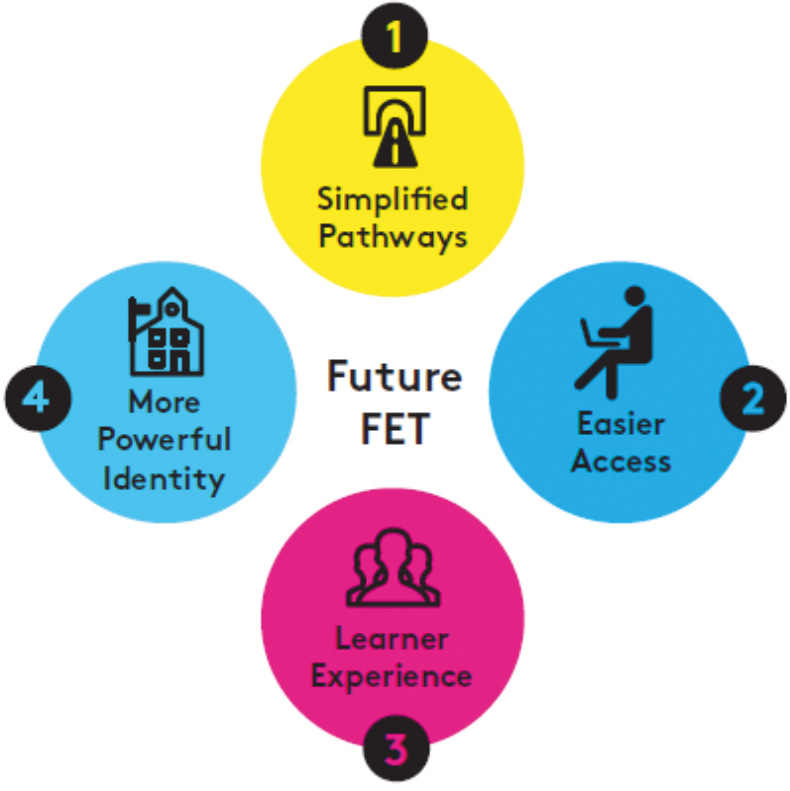

The effects of Covid-19 and the looming threat of Brexit show the importance of a strategic and agile FET system. ETBs and other FET bodies have responded admirably to the challenges of 2020, while the creation of the new government department and its launch of a new FET strategy point to an exciting future for the sector, as this article reports.
In common with just about every aspect of the world we live in, 2020 has been an unprecedented and challenging year for further education and training (FET). Our ways of working, and of accessing and engaging in learning, have fundamentally changed during the course of the year, and it seems increasingly likely that there will be a permanent legacy and impact, even if the threat from Covid-19 diminishes over time.
The initial changes happened virtually overnight, when the first lockdown was announced in March, closing all FET facilities with immediate effect. The core aim across SOLAS, Education and Training Boards (ETBs), and other FET providers was to ensure that learners were protected and could continue, as far as possible, to access learning and support throughout this period. Alternative assessment approaches were in place to allow them to complete their courses and receive certification.
We worked closely with government and all our relevant stakeholders to coordinate an effective emergency response. Key aspects included:
All of this work was complex yet critical, and the key to success lay in the strong working relationships across all of the key organisations. This was helped by a range of tertiary-education system response structures put in place to facilitate common approaches and solutions across both FET and higher education. Particular thanks must go to the incredible staff working across FET, who went above and beyond to ensure that learning kept flowing and learners and apprentices continued to be supported.
[ctt template=”1″ link=”5QdbG” via=”yes” ]“I believe the crisis created a moment of opportunity for Further Education & Training (FET)[/ctt]
The value of this comprehensive and coordinated response is borne out by the fact that at the time of writing, as 2020 draws to a close, the number of learners benefiting from FET during the year – approximately 200,000 unique learners across the system – has remained largely on a par with 2019, with participation from some of the most vulnerable target groups also at similar levels to last year.
Yet I believe the crisis also created a moment of opportunity for FET. As was noted in Ireland’s Yearbook of Education 2019–2020, at the beginning of 2020 we were on the cusp of launching a new five-year strategy for the system, following extensive consultation. This prospective strategy was centred on ensuring a more agile approach by FET to meet the rapidly evolving requirements of work, enterprise, society, and our communities.
Never was this need more apparent than at the onset of a pandemic which was severely constraining levels of social and economic activity and traditional means to deliver learning. It was imperative that FET respond to the impact and legacy of Covid-19 to ensure that those left unemployed were given the upskilling and re-skilling support to find a pathway back into sustainable work.
This was built into the short-term response by SOLAS, ETBs, and other FET providers, and was reflected in the draft strategy as an immediate priority. The rest of the strategy remained valid and highly relevant, with its emphasis on simplified pathways, easier access, consistent learner experience, and a stronger identity, and was hence ready for government endorsement and delivery.

This came on the formation of the new government and the exciting creation of a new Department of Further and Higher Education, Research, Innovation and Science (DFHERIS). The new dedicated focus on all of tertiary education, bringing together FET and HE, offers real potential for FET and apprenticeships to grow their profile and contribution in meeting Ireland’s future skills needs. Minister Simon Harris, appointed to lead the new Department, was quick to assert its commitment to a dual focus of facilitating both economic progress and social cohesion.
With Minister Niall Collins also appointed as Minister of State with a specific remit to look at further education and skills issues, the establishment of DFHERIS represented a real endorsement of the triple-pronged approach that characterises FET: skills, pathways, and inclusion. Indeed, one of Minister Harris’s first acts was to launch the new FET strategy, ‘Transforming Learning’, and to commit to supporting its roll-out over the next five years. The central ethos of the new strategy is that ‘FET is for everyone, regardless of any previous level of formal education, available in every community, and can offer you a pathway to take you as far as you want to go’.
The new Programme for Government (PfG) reflected a lot of the priorities set out in the Future FET strategy, including the need for a Covid-19 upskilling response; further expansion of apprenticeship; a more integrated approach to literacy, numeracy, and the digital divide; pathways from school to FET; and a green skills agenda. The second half of the year has continued to require adapting to the evolving restrictions caused by the ongoing prevalence of the virus; nonetheless, there has been a real focus on kick-starting action against all of these commitments. Highlights include:
All of these developments characterise the innovation and excellence that we see from ETBs and throughout the FET system every day. The pandemic has brought into sharp focus the need for transformation in how we learn. Add to that the looming threat of Brexit, and the importance of a strategic, agile, and responsive FET system is apparent like never before.
The way that ETBs and other FET providers, agencies, and bodies have responded to recent challenges underlines their commitment to shape and lead this next critical phase of development, and we would like to thank them for their continued excellent work. The future of FET is exciting. The future of FET is now, and we look forward to working with you all on this exciting journey.
Copyright © Education Matters ® | Website Design by Artvaark Design